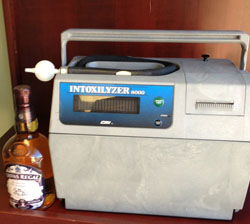Contesting the Breathalyzer Test in Oklahoma

“Do you mind taking a breathalyzer?” If you are suspected of driving under the influence (DUI) in Oklahoma, it’s one of the first questions you’ll be asked. However, it’s important to remember that—even if the reading indicates that you failed the test—challenging the results of your breathalyzer and preventing them from being used against you in court may be possible.
The Edge Law Firm has the skill and experience necessary to help individuals who were arrested for drunk driving after failing the breath test. In fact, the attorneys at The Edge Law Firm have not only undergone training on the Intoxilyzer 5000 and Intoxilyzer 8000, but Bruce Edge actually owns the only 2 Intoxilyzer 8000’s privately owned in the state of Oklahoma—which gives you the upper hand when challenging the results of your breath test. All of our attorneys have been trained with this machine by the State Of Oklahoma, just like police officers.
Understanding Blood Alcohol Content
From a legal perspective, your ability to drive is based on the amount of alcohol in your bloodstream—a ratio known as blood alcohol content, or BAC. According to federal law, anyone with a BAC of 0.08% or higher is considered legally impaired and should not be operating a vehicle. Based on this information, anyone caught driving with an illegal BAC can be prosecuted for driving under the influence.
If an officer suspects you are intoxicated, he or she will conduct a chemical test to determine your blood alcohol content. In most cases, this test will be administered on a breathalyzer; however, a blood or urine test may be used in some occasions. To perform a breathalyzer, you must blow into a tube-like device for a short period. The device will then analyze your breath sample to determine whether any alcohol is present. If the test detects alcohol, it will then calculate your BAC based on the amount of alcohol it finds—and if the results indicate that you have a BAC above the 0.08% limit, you will be arrested and charged with driving under the influence.
Challenging Your Test Results
Breathalyzers are not perfect. Like any mechanical object, the device is prone to technical and/or operator error. To ensure the test calculates BAC correctly, the device must be calibrated regularly—and state law requires officers to keep detailed maintenance records to prove they have met this requirement. If there are no maintenance logs available, or they are incomplete, your test results will most likely be deemed inadmissible in court. You may also be able to challenge your breathalyzer results if you can prove that the officer who administered the test was not trained properly.
But what if neither of the above strategies is appropriate for your case? Don’t panic—many other factors can impact your breathalyzer test results, including your gender, medical history, and body temperature, just to name a few.
Please submit our secure contact form below:
